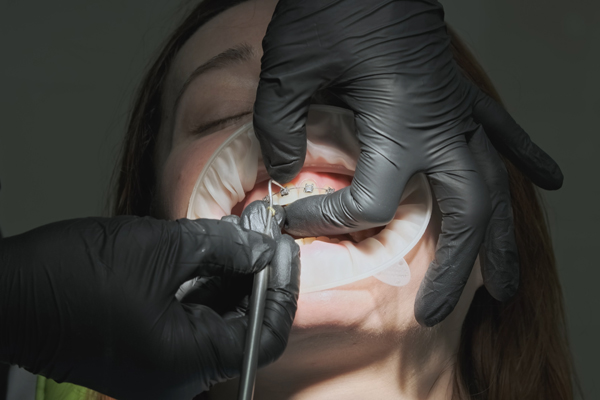3 Questions To Ask Your Orthodontist About Braces

Braces can be a daunting prospect. However, our team will walk you through the entire process to ensure you comprehend and are comfortable with your treatment plan. The first step in achieving this is the initial consultation with our orthodontist, where you can ask as many questions as necessary. Below we have outlined three questions to prepare you for your consultation.
What to ask during your braces consultation
What are the different types of braces?
Contrary to popular belief, there is more than one type of braces. Our orthodontist will assess the patient’s individual needs during the consultation and recommend one of the following:
- Metal braces: These are the original braces that date back 100 years. However, their aesthetic has improved drastically over time. Also known as traditional braces, the brackets and wires are made of stainless steel. The metal brackets are applied to the front of the teeth, and the wires are connected through each bracket, applying a gentle force.
- Self-ligating braces: This involves a unique system of wires and brackets used in place of elastic ligatures. The self-ligating bracket has a built-in mechanism that automatically closes it when placed on the tooth. This eliminates the need for elastic ligatures previously used to hold the archwire in place.
- LightForces braces: 3D-printed, fully customizable braces designed to fit each patient’s unique dental anatomy for optimal comfort and precise results. Comprising translucent material, they offer a discreet appearance while providing effective and efficient orthodontic treatment.
How long do braces take?
Treatment duration varies. It depends on the type of braces and the severity of the patient’s bite or malocclusion. In some cases, patients only need to wear their braces for six months, while others may need them for over two years. Additionally, if a patient responds quickly to treatment and follows all the orthodontist’s recommendations for their care and lifestyle changes, they may be able to shorten their treatment time.
How will my life change with braces?
The main lifestyle changes will come from food choices and adjustment appointments. No matter the type of braces a patient receives, they should avoid the following types of food:
- Uncut hard foods (i.e., apples, carrots, celery, raw broccoli, popcorn)
- Chewy foods (i.e., candy, gum, caramel)
- Tough meats (i.e., dried meats, tough steaks)
After determining the braces type the patient will receive, our orthodontist will provide a more detailed list of foods to consume and avoid.
The patient must also schedule several visits to our office throughout their treatment. During each visit, the orthodontist will check for any problems, fix broken brackets or wires, monitor alignment changes, and tighten the braces as needed. Our team will also remove any signs of plaque or tartar around the braces to ensure they function properly.
Schedule your consultation today
We hope this article has helped prepare you for your consultation. If you have any additional questions about braces and treatment, we encourage you to have them ready for your appointment. Write them down, if necessary. Our team is here to help guide you or your teen from start to finish.
If you have not already, contact our Cleburne office at (817) 522-7358 to schedule a consultation. We look forward to speaking with you.
Check out what others are saying about our services on Yelp: Read our Yelp reviews.
Related Posts
If you are considering teeth straightening, then you probably know about the physical benefits. Straightening can make it easier to clean your teeth and prevent cavities. But it can have further-reaching benefits as well. The American Association of Orthodontics states that more than four million Americans have braces. And 25% of those people are adults.Studies…
Visiting a kids orthodontist at the right time allows for early detection of potential alignment issues and helps determine if your child will need treatment in the near future. Prioritizing orthodontic treatment enhances the appearance of a child's smile and supports proper dental development and health. However, it is normal for children to feel hesitant…
Clear aligners are a popular way to address orthodontic issues, such as crooked or crowding teeth. Over the years, the technology behind clear aligners has greatly improved, which has created competition when it comes to choosing aligners over the traditional route of metal braces. When having the teeth straightened with clear aligners, the entire process…
If you are told your child needs braces, but you do not like the idea of traditional metal braces, you might consider ceramic braces as another option. To help determine if these are the right option for your child, we have compiled a list of frequently asked questions about alternative ceramic braces. One of the main…


